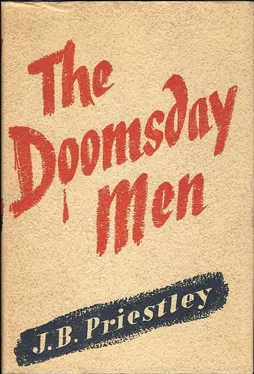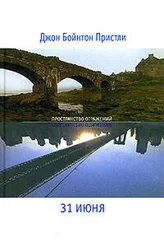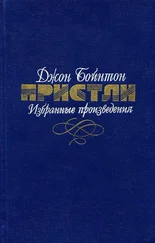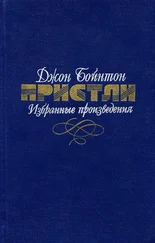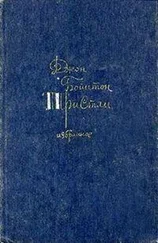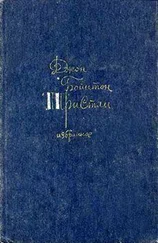Slowly leaving the ranch-house, Andrea and Malcolm came up to Hooker under his tree. “What are you doing, Hooker?” asked Malcolm, with that touch of irritation often felt by the idle for the deeply employed.
Before Hooker, coming out of his mathematical dream, could reply, Andrea looked hard at the notebook he was holding. “I’m nearly sure my uncle used to have that kind.”
Hooker blinked a little. “This was one of your uncle’s,” he mumbled, looking rather shamefaced. “I don’t know if you remember, but I managed to get into his room, before the fire had reached that end of the house, and though it was all smashed up, I salvaged three of these notebooks of his. I’m trying to follow his tracks, because he only dropped a hint or two, that last night, about what he’d discovered. I haven’t got fairly on to them yet, but these notes of his look dandy to me. I never liked him, I guess, but-say, he was a great physicist.”
“I’ve never asked before-though I suppose you’re tired of talking about it,” said Andrea, hesitantly, “but why was it such a failure then?”
“He was too rushed. That’s the first thing. I don’t know why,” said Hooker thoughtfully, “though I might when I’ve been through these notebooks, but he felt compelled to hurry it on too quickly at the end. And then, of course, the current being cut off at the last moment, that upset all his calculations. What really happened, down there under the tower and way back under the hill itself, we don’t know yet, but as soon as they’ve cleaned it up a bit on the surface, I’m going to have a look. I’ve been given permission, officially, to investigate. That’s why I’m concentrating on these notebooks. And-boy-are we going to have something to tell ’em! Here, sorry, Andrea-I oughtn’t to be talking this way, I guess, to you,” he concluded lamely.
Andrea shook her head and smiled rather wanly, then she and Malcolm walked slowly across the tiny pasture towards the hill away from the road and opposite to that on which Jimmy was sitting. They never noticed the little cloud of dust moving up the valley, and if they heard the distant sound of a car they were not sufficiently curious about it to turn round. But now they had begun to talk, after several despairing appeals from Malcolm, and as they talked they wandered towards a tiny clump of box-elder trees, which were almost as white and dusty above as the strange and ghostly desert holly scattered on the valley floor, but which seemed still to cast a friendly green shade. And here in this shade, they stopped.
“You see,” said Andrea miserably, “I can’t marry you. I couldn’t marry anybody, but anyhow that’s not the point because I don’t want to. No, it’s not because of all the horrible talk and fuss, which I suppose may go on for ages. That’s bad enough, but it isn’t that.”
“Well, what is it then?” cried Malcolm. “Is it-something about me?”
“No, you idiot, how could it be?” she cried, smiling for once. “It’s me. Don’t you see, my-those three-as everybody says now-must have been mad. All three. And I believe my grandfather was queer too-”
“That doesn’t matter,” said Malcolm sturdily. “You’re not off your head, except at this minute, and you’re never going to be.”
“You can’t tell. And everybody knows that it runs in families. Even if I’m all right, suppose we-I-had some children-and they began to be queer?”
“You know,” said Malcolm gently, following his own thought and not hers, perhaps deliberately, “those three-I suppose they were mad in a way-they’d got shut up inside themselves-”
“As you tell me I do,” she put in, hastily.
“No, not like that. They had somehow got themselves all shut in, so that they could only see everything from one point of view-I mean, they were different among themselves, of course, but each just saw everything from his own point of view-but there was a kind of grandeur-a sort of nobility-about them, quite different from ordinary lunatic stuff.”
“There you go, you see-even you-talking about lunatic stuff. And whatever you may say, I’m one of them. One of them was my father-that seems very strange now, but after all it’s true-and the other two were my uncles.”
She looked at him mournfully, and he tried to take it easily and smile but somehow he couldn’t. And there they stood, dumb and frustrated, in the middle of the shining day. They were silent for some time, just staring at each other, with the same melancholy little troop of thoughts going round and round in their heads.
“No, Malcolm, it’s hopeless. I seem to have been saying that about one thing or another ever since we first met. But there it is. Still hopeless. However much I may pretend, or you pretend for me, I’m a MacMichael.”
“Hey, what’s that you’re saying?”
They swung round, and were surprised, rather annoyed. The intruder came up cheerfully.
“Hello, Mr. Mitchell,” said Andrea, without enthusiasm, though trying to be friendly, “how do you come to be here?”
“Oh!-I just wandered along,” said the bearded man, who still wore the same disreputable garments and the same surprising air of distinction in them. “Hallo, young man! You both seem to have recovered from your adventure pretty well. But now, young woman, I know I shouldn’t ask and it’s the height of bad manners and tactlessness, but would you mind repeating what you just said to this not very cheerful young man?”
“If you must know,” said Andrea, not snubbing him unpleasantly, however, but rather as if she were showing poor Malcolm the strength of mind she had in the presence of this comparative stranger, “I was telling him I couldn’t marry him because I’m a MacMichael.”
“Is that the only reason?” asked Mr. Mitchell, who appeared to think it amusing.
“Golly-yes, of course,” she replied in a sort of fine confused mixture of enthusiasm, tenderness and misery.
“Then go ahead, because, you see, you’re not a MacMichael.”
“What?” And they shouted it together.
“You’re not a MacMichael. You were Henry MacMichael’s step-daughter, not his own daughter. And your name’s really Mitchell.”
“But you’re-”
“No, I’m not your father, if that’s what you were going to say. I wish I was. I’m merely your uncle, your father’s brother. He died two years ago, in Peru. His name was Scott Mitchell-like me, a mining engineer. You see, my dear, we both wanted to marry your mother, whom we’d known since we were boys, and he-well, he was the lucky one, though poor Scott was never lucky long. He was a bit wild, never kept a dollar, and not long after you were born, your mother left him. I took Scott away, had to do something with him. There was a divorce, and then, while you were still a baby, Henry MacMichael became your step-father and insisted upon giving you his name. If your mother had lived, well she’d probably have told you herself-but she didn’t, and then there was nobody to tell you. My brother, who’d had dealings with the MacMichaels before and didn’t like them or their methods, wouldn’t come back here at all. But he knew I’d be coming back-and he asked me-it was about the last thing he ever said to me-to see what was happening to you, though I’d have done that without being asked. I’ve some things of his-old photographs and so on-that you’d probably like to have. And that,” he turned suddenly to Malcolm, in order to leave Andrea to herself a moment, “explains a little urgent conversation you and I had last week, not far from Jubilee Pass.”
“I tried to act on your advice then,” said Malcolm happily, “and I’m still going to act on it.”
“I’ll leave you to get on with it,” said Mr. Mitchell, twinkling away, and after giving Andrea a new avuncular smile, he showed them the very creased and stained back of his disreputable jacket, as he took it and himself back to the ranch-house, out of which a very impatient Mrs. Atwood, almost dancing with curiosity, suddenly appeared. But she did not remain long with Mr. Mitchell. After firmly introducing him to Hooker, and compelling that long lean young man to emerge from his notebook and be sociable, she tripped up the hill, ostensibly to tell Jimmy Edlin the news. On the way there she told herself not to be a silly woman, that she’d no right to feel disappointed with Jimmy, that they were all good friends and what more could she expect, and much more stuff of the same kind. And there he was, painting away like a real artist, his pipe stuck in his mouth but no smoke coming out of it, his broad face very red and moist, his eyes screwed up comically, an entirely unromantic figure to every possible person in the world except one. But she was remembering, though she didn’t want to at this particular moment, and felt it was downright tiresome of her to do so, the terrible afternoon-and who could believe it was only a week ago?-when he had put her in that plane beside poor Charlie and remained behind himself. Unromantic figure indeed! Just the right age and size and shape of a man!
Читать дальше
